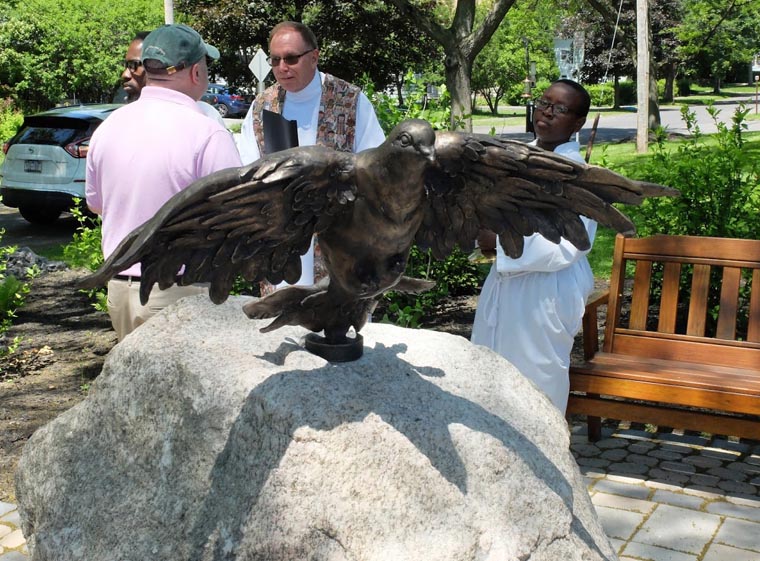Bronze statue of dove highlights contemplative spot
By Tom Maguire | Associate editor
A moment of silence befits a Garden of Peace.
Three weekends ago, All Saints Church in Syracuse dedicated and blessed the little garden that honors the memory of children born and unborn.
After each of the three weekend Masses, the pastor, Father Fred Daley, invited the congregation to step into the garden. He and two altar servers led the procession. After a moment of silence, those in attendance were invited to mention the names of children who died. Then parishioners extended their hands as Father Daley blessed the new garden.
The 10-minute service concluded with the singing of a hymn, “Surely the Presence (of the Lord Is in This Place),” by Lanny Wolfe. Then the attendees received a holy card that reads, “Allow God to love you/And bring you peace.”
The garden is right behind the church, under two tall honey locust trees. Flowers, small shrubs, annuals, hanging baskets, and inlaid stones decorate the spot, which measures about 50 feet at its longest. In the middle of the garden is a bronze sculpture of a dove alighting on a four-foot-high boulder that features pinkish, sandy, and mossy tones. The dove’s muscular shoulders seem built to carry heavy loads of solace to those who need it.
Father Daley noted that a dove is a sign of hope and the Holy Spirit.
A number of people in the parish have lost a child, he said, either born or unborn, rather recently and some many years ago. It was a “very powerful moment,” he said, when people at the dedication publicly mentioned the names of children who have been lost.
The “contemplative, reflective little area” is a “gift for the whole parish,” he said, and anyone from any faith is welcome to visit it — “just a special spot where people can go.”
An excellent gardener himself, Father Daley supplied the hanging baskets and offered valuable advice to the All Saints small faith community that worked on the project. It took a lot of energy, time, and planning by the small faith group and the pastoral council, he said.
The idea for the garden came up about eight years ago, and planning intensified three years ago. The small faith group, consisting of about 10 people, raised money from people who wanted to help; no parish funds were used.
A member of the small faith group, Barbara Hadley, lost two sons to cystic fibrosis: James Hadley, 21, in 1985, and Jonathan Hadley, 11, in 1976. She has three living children, she said, and all are doing well. She said the garden is for anyone who lost a child through miscarriage, or unfortunate abortion, or any other reason and at any age. Three wooden benches beckon passers-by to sit and reflect for a minute. The stonework consists of oval, square, and rectangular bricks in grays and pastels.
But Hadley doesn’t need a pretty garden to remember her lost sons, she said; they are always in her heart. To her, the Garden of Peace is “just a quiet place to be.” She invites people to visit the garden for “whatever is going on in their lives.”
“Just sit and be calm,” she said. “It’s a busy world, so all are welcome there. It’s not just our parish; it’s [open] to anyone.”
The leader of the small faith group that worked on the garden, Ginnie Winters, said, “We were inspired by the Holy Spirit. … That’s the only way we could have done all this.” Jobs for the group included writing invitations, doing the poster board, and putting a notice in the bulletin.
“So many lives have been touched by children who passed away,” Winters said. Of the dedication ceremony, she said, “It was emotional but we came away with a very nice feeling. There was a very peaceful feeling at the end of the ceremonies.” She herself remembers that she had a cousin who passed away as a three-year-old.
On a recent calm evening in the Peace Garden, tiny insects alighted on the dove but this did not violate any protocol in a garden that was built for all.




